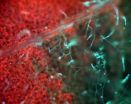Obese women with ER-positive/HER2-negative breast cancer have poorer survival rates
2010-12-10
(Press-News.org) SAN ANTONIO — Obesity was associated with worse overall and disease-free survival in women with operable breast cancer treated with adjuvant chemotherapy, but for the first time, researchers observed this finding in only a specific subset of patients – those with estrogen receptor (ER)-positive/HER2-negative disease.
About one third of all adults in the United States are obese, posing a major public health problem because of obesity's association with an increased risk of diabetes and heart disease. This study indentified a new hazard associated with obesity.
Results were presented at the 33rd Annual CTRC-AACR San Antonio Breast Cancer Symposium, held Dec. 8-12, 2010.
"We were surprised to find that there was no evidence that this finding played out in the other breast cancer subtypes – it's mainly a phenomenon that we seem to be seeing those with ER-positive/HER2-negative disease," said Joseph A. Sparano, M.D., professor of medicine and women's health at Albert Einstein Medical College of Medicine and associate chairman of the department of oncology at Montefiore Medical Center in Bronx, N.Y.
"Our results may be explained by the fact that obesity is associated with hyperinsulinemia, which may drive the growth of estrogen-dependent tumors," said Sparano.
Sparano and colleagues conducted a retrospective study to evaluate the effect of obesity on the outcomes of three Eastern Cooperative Oncology Group trials: E1199, E5188 and E3189. All three trials involved doxorubicin/cyclophosphamide and other agents.
The researchers first evaluated the relationship between body mass index (BMI) and disease-free survival and overall survival in the E1199 trial. Results showed a nonsignificant trend toward worse disease-free survival and overall survival for the obese patients compared with others.
However, after evaluating these data by breast cancer subtype, obese women with ER and/or progesterone receptor (PR)-positive/HER2-negative disease had significantly worse disease-free survival and overall survival. The same effect was not seen in women with HER2-positive and triple-negative disease.
After this initial finding was seen in the E1199 trial, the research team attempted to validate these findings in two other trials, one of which included only ER-positive disease (E5188) and a second that included only ER-negative disease. The results held up in these two other studies – obesity was associated with worse outcomes in patients with ER-positive disease in the E5188 trial, but only in patients with ER-negative disease treated in the E3189 trial.
"If validated in other studies, this finding provides strong rationale for trying to identify potential causes, and prospectively evaluate intervention strategies designed to reduce their risk of recurrence," Sparano said.
The researchers plan additional studies to evaluate the relationship between obesity and tumor gene expression, and to identify other host factors that may be associated with recurrence, such as insulin and other growth-factor levels.
###
Follow the AACR on Twitter @AACR, and throughout the meeting using the hash tag #SABCS.
Recordings of the teleconferences and video interviews with researchers will posted to the AACR website throughout the meeting: http://www.aacr.org/page23506.aspx.
The mission of the CTRC-AACR San Antonio Breast Cancer Symposium is to produce a unique and comprehensive scientific meeting that encompasses the full spectrum of breast cancer research, facilitating the rapid translation of new knowledge into better care for breast cancer patients. The Cancer Therapy & Research Center (CTRC) at The University of Texas Health Science Center at San Antonio, the American Association for Cancer Research (AACR) and Baylor College of Medicine are joint sponsors of the San Antonio Breast Cancer Symposium. This collaboration utilizes the clinical strengths of the CTRC and Baylor, and the AACR's scientific prestige in basic, translational and clinical cancer research to expedite the delivery of the latest scientific advances to the clinic. The 33rd annual symposium is expected to draw nearly 9,000 participants from more than 90 countries.
ELSE PRESS RELEASES FROM THIS DATE:
2010-12-10
SAN ANTONIO — Only half of eligible women in the United States are getting their annual mammograms, even if they have insurance to pay for the procedure, according to data presented at the 33rd Annual CTRC-AACR San Antonio Breast Cancer Symposium.
Last year the U.S. Preventive Services Task Force, an independent panel of non-federal experts in prevention and evidence-based medicine, recommended that the age of first mammogram be lifted from 40 to 50 years of age, at which biennial mammography begins, and caused a public outcry. To date, no major insurance company or other ...
2010-12-10
SAN ANTONIO — While endogenous estrogen (i.e., estrogen produced by ovaries and by other tissues) does have a well-known carcinogenic impact, hormone replacement therapy (HRT) utilizing estrogen alone (the exogenous estrogen) provides a protective effect in reducing breast cancer risk, according to study results presented at the 33rd Annual CTRC-AACR San Antonio Breast Cancer Symposium, held Dec. 8-12.
"Our analysis suggests that, contrary to previous thinking, there is substantial value in bringing HRT with estrogen alone to the guidelines. The data show that for selected ...
2010-12-10
SAN ANTONIO — The long-awaited results of the Adjuvant Treatment with Zoledronic Acid in Stage II/III Breast Cancer, the AZURE trial, will be presented at the 33rd Annual CTRC-AACR San Antonio Breast Cancer Symposium, held here Dec. 8-12.
"Adjuvant use of bisphosphonates like zoledronic acid is widespread among women with breast cancer, and the results of this trial will help answer many questions as well invite new ones," said Robert Coleman, M.D., professor of medical oncology at the University of Sheffield in England.
Coleman will present the results of AZURE during ...
2010-12-10
SAN ANTONIO — Exemestane, an aromatase inhibitor that blocks production of estrogen, may provide another post-surgery option for postmenopausal women with hormone-receptor positive, early-stage breast cancer.
In the first head-to-head adjuvant clinical trial comparing two aromatase inhibitors, anastrozole and exemestane, the drugs resulted in similar survival rates and prevention of breast cancer recurrences. Some differences in the side effect profile were seen, including a potential difference in the risk of developing osteoporosis.
Paul E. Goss, M.D., Ph.D., professor ...
2010-12-10
Scientists have sequenced the genome of a major fungal disease that affects barley and other cereal crops, a breakthrough that could lead to significant advances in our understanding of how plant diseases evolve. The research, published today in the journal Science, suggests that parasites within the genome of the fungus help the disease to adapt and overcome the plant's defences.
The study could help with the development of new agricultural techniques for protecting cereal crops from infection. Barley grains are the basis of many staple foods, and also central to the ...
2010-12-10
New research reveals that the abundance of so-called highly siderophile, or metal-loving, elements like gold and platinum found in the mantles of Earth, the Moon and Mars were delivered by massive impactors during the final phase of planet formation over 4.5 billion years ago. The predicted sizes of the projectiles, which hit within tens of millions of years of the giant impact that produced our Moon, are consistent with current planet formation models as well as physical evidence such as the size distributions of asteroids and ancient Martian impact scars. They predict ...
2010-12-10
Norwich scientists are on the trail of some of the most economically damaging organisms that infect crops worldwide. Their latest targets are the parasitic water fungus that causes powdery mildew and the water molds that cause late blight in potatoes and tomatoes and downy mildew in cruciferous vegetables and other crops.
"We have been studying the late blight pathogen for a while," said Professor Sophien Kamoun, head of the Sainsbury Laboratory on the Norwich Research Park. "In separate research we are trialling plant genes that mediate blight resistance, while in this ...
2010-12-10
A team of scientists led by Melissa Rolls, an assistant professor of biochemistry and molecular biology at Penn State University, has peered inside neurons to discover an unexpected process that is required for regeneration after severe neuron injury. The process was discovered during Rolls's studies aimed at deciphering the inner workings of dendrites -- the part of the neuron that receives information from other cells and from the outside world. The research will be published in the print edition of the scientific journal Current Biology on 21 December 2010.
"We already ...
2010-12-10
PITTSBURGH—If you're looking to lose weight, it's okay to think about eating your favorite candy bar. In fact, go ahead and imagine devouring every last bite — all in the name of your diet.
A new study by researchers at Carnegie Mellon University, published in Science, shows that when you imagine eating a certain food, it reduces your actual consumption of that food. This landmark discovery changes the decades-old assumption that thinking about something desirable increases cravings for it and its consumption.
Drawing on research that shows that perception and mental ...
2010-12-10
An international team of scientists, which includes researchers from Virginia Tech, has cracked the genetic code of a plant pathogen that causes downy mildew disease. Downy mildews are a widespread class of destructive diseases that cause major losses to crops as diverse as maize, grapes, and lettuce. The paper describing the genome sequence of the downy mildew pathogen Hyaloperonospora arabidopsidis, which attacks the widely studied model plant Arabidopsis thaliana, is the cover story of this week's edition of the journal Science.
In the paper, the sequence of H. arabidopsidis ...
LAST 30 PRESS RELEASES:
[Press-News.org] Obese women with ER-positive/HER2-negative breast cancer have poorer survival rates


